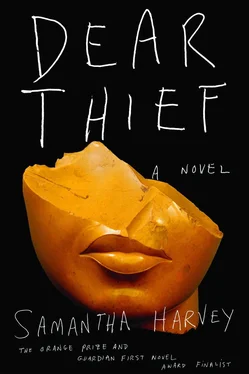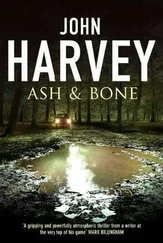I deal you four low cards, which leave you on something like sixteen. Deal me a queen or a king, you say, with a jut of chin and a short laugh. Bust me. Your face is surprisingly tender with its Spanish tan. When you make this invitation for me to bust you (half teasing, half morbidly serious), I know you know that there have been poisonous words hissed in your name in a marble-floored room at the back of the villa; you seem to know that I pummelled my fist uselessly into the side of Nicolas’ neck, how I saw that new light you put in his eyes and flailed my hands at it. You look at my hands holding the spread of cards as if they are something quick and savage that has, by mercy, gone temporarily still. Your moist bright eyes seem to say, Did you feel like strangling him, like strangling me? — then maybe you should have. You should kill me or leave him, your expression suggests. Or both, do both. And so, asserting my only power, I do neither. It is like we have turned a corner with one another. You have wronged me, and you dare me to care.
I deal you a nine. Not a theatrical bust, but bust all the same. You say we should pray, just in case. Pray for what? In case of what? In case God exists and praying makes a difference, you say. So we pray separate silent prayers while we bend cards from pack to hand and we agree not to tell the other what was asked for. Whoever wins, you decree, will have their prayer answered. It comes down to the next game. I win again. You gather our cards in a small, neat heap and say that in this case I shall have my prayer. But I prayed I would lose, I say.
You dip your hands into the gloom beneath the reach of the two wall lights, re-deal and remind me with a smile and a sigh, and with no words, that the victorious never pray to lose. Without discussion, we switch to Poker and gamble with a stack of coppers, undisturbed by the universe until two in the morning when Nicolas arrives home from a show in London and almost wordlessly shifts away upstairs to sleep, like an animal that has been ousted from the pack and is too tired to fight its way back in.
Without him we go on in this sweet, smoky, murmured combat of yours, which is the only way of loving you know, just like a dog loves a bone. With its teeth and also its tongue. I win a hand, you win a hand; we play so long we start to read one another’s cards with our minds.
Afight broke out at work today. One of the residents commented that in Australia there was a ban on smoking in restaurants. His daughter had been there and had reported this news back; I bet England will soon be doing the same, he said. You watch.
I couldn’t have anticipated the reaction to this. These are people who receive news of fatal heart disease or nephritis or the death of a spouse or child with a certain aged poise, yet rumour of a smoking ban in restaurants inflames them to violence. One of the more dispassionate residents, Claudia, pointed out that they didn’t go to restaurants anyway, so what did it matter? This was where Frances, who has been made bent and quiet by months of pleurisy, found her verve again for a minute. Nothing in life stays where it is, she said; it starts in a restaurant in Australia and suddenly it’s everywhere — not just restaurants but every last place, including their smoking room at the back of the lounge and their summer house in the garden. Everything spreads like a joke, and suddenly you’re eighty-seven and you can’t smoke in your own summer house. Then you have to stand out in the rain, and life’s bad enough without that.
Claudia replied that they shouldn’t smoke anyway. Uproar ensued. Frank, sitting next to her in the lounge, reached across and grasped her wrist with a fervour I cannot say I have ever seen in him before, and Claudia’s response was fast and majestic — an arcing slap to the face, her pink-nailed hand flying so elegantly towards the nice flat mottled surface of his cheek. I intervened. Please, I said, be calm. But by then there was shouting and rebellion against Frank for his violence towards Claudia, which lasted only so long. As soon as Frank reminded them of what Claudia had said, the judgement she had made about them, opinion swung. Who was she to say they shouldn’t smoke? Who were the Australians to say they shouldn’t smoke? When you’ve fought in a war in the East African mountains or driven an infantry tank into a destroyed Normandy village and put your own neck on the line for your country, why not smoke your lungs down to prunes? They’re your own lungs, that’s the thing, why not?
And suddenly somebody took off his shoe and threw it at the wall, and so more shoes flew, and magazines, and cups were overturned, and even non-smokers became incensed. I am not sure anybody really knew what they were incensed about — but then I have always been amazed and amused by how quickly causes crumble and general childishness and petulance begin. Part of me wanted to applaud them. It is good to get angry, to throw your shoe! I wanted to throw mine. Instead I had to calm them down, which I did by standing in their firing line with my eyes closed and arms open. The shouting died down and the last of the flung things hit the wall or floor with apologetic thuds.
Then I collected and reallocated possessions. In all of this, Gene had been sitting at the table in the corner taking apart the TV remote control, which has broken. He had laid out its component pieces and started putting them together again with only an occasional glance up at the furore. I made tea in two large stainless-steel pots, took one pot out to the summer house for the smokers who had made an emergency congregation there, and the other to the lounge. They all drank with those glassy fevered eyes that you only see in the elderly; even Claudia joined their larger cause and drank with them. Frank stroked her wrist and muttered warmly, Bastards! A swear word thrown back at the things that deny us, I suppose. Anger at the brutality of getting old. Later I found a teaspoon wedged in the bars of the gas fire, now bent because I had to prise it out. When I found it, there was a pool of tea in its belly still, held down by some centripetal force while the thing spun across the room. I stole it. Because it reminds me of your hurled fork I will enclose this little trinket of rebellion with the letter.
Where are the younger selves in these people? Did we see them just then? Was that a thirty-year-old Claudia who unleashed a slap across Frank’s face? Was it a teenage Frank who muttered, Bastards ? Did the eighty-year-old man throw the shoe, or did some stubborn child inside him do it? Some child who doesn’t understand the concept of eighty, let alone the practicality of getting there. A strange thing happened at The Willows during that fight, a truly strange thing: ghosts appeared. For a few minutes our number was doubled and we had the company of ghosts of selves past. I saw them at everyone’s backs, I felt them. Young, lean rebels; I felt them, Butterfly. And then what? When we settled back down into our chairs, where did they go? When will they come back? Do they mind our betrayal of them?
I am not only talking about getting older, no, I am talking about splintering. We hit certain points, we splinter, and bits of ourselves are left behind. I don’t know why this should be, only that time isn’t a slick medium that we slide through into old age, it is lumpy and irregular and breaks us into pieces. I see Nicolas dancing in the house in London or I see the man with leaves in his hair, who walked tall and was happy one autumn morning, or I see myself somewhat vaguely (it is always vague with myself) taking bones out of the sedge at the shore or standing with my arms crossed in the kitchen doorway watching Teddy immerse his hands in puddles on the patio. There is freedom there; there is always freedom in the past. The self you left behind lives in endless possibility. The older you get, the bigger and wilder the past becomes, a place that can never again be tended and which is therefore prone to that loveliness that happens on wastelands and wildernesses, where grass has grown over scrap metal and wheat has sprung up in cracks between concrete and there is no regular shape for the light to fall flat on, so it vaults and multiplies and you want to go there. You want to go there like you want to go to a lover.
Читать дальше












